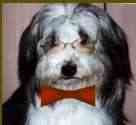
Hobo's Advice Column |
Welcome to my advice column.
Remember, I am only a dog like you. My opinions are
to the best of my knowledge but are only opinions, researched or what
I feel is correct.. The writer of this page is not responsible
for any actions the reader may take as a result of reading this column.
If that is OK with you, keep reading. If not, then go back and enjoy
the other pages. You can address your questions to Hobo
by email with the topic Hobo's Advice (click on my picture) |
|
And more columns |
Antifreeze like you use in your car can attract pets. It is very sweet tasting. Remember that most types of antifreeze contain ethylene glycol and can poison your dog (people too). Complications include irreversible kidney damage, coma and death. Cars can be dangerous in the winter. Leaving your dog alone in the car can cause freezing or even exposure to dangerous Carbon Monoxide if your car is left running. Dogs and Cats left running out in the cold may find the warm car an attraction. If they get too close to the engine or exhaust system they can burn themselves on the hot surface. Even if they do not get burned, they may be under the car when you drive away and could get run over. Look under the car and bang on your car's hood to scare them away before starting your engine. Small animals may have crawled up under the hood into the engine compartment seeking warmth. Freeze - Don't be guilty of leaving your dog outside when the temperature is below freezing or during extremely cold weather. If you have a dog house, be sure you have provided enough insulation and/or heat. I once saw a dog frozen in a standing position where he appeared to be looking in the front door of his own home. The owner had searched all night, but the snow was blizzard like and they failed to see him just a few feet away. But remember that it is more difficult for a dog to be constantly going in and out, than it is to stay outside longer. Dogs get used to cold weather when they spend a lot of time outside. Just don't leave them outside when it is extreme. And when you do, provide some shelter. Consider a doggy sweater or coat, especially if you have a short haired dog. Older dogs and puppies may also be more sensitive to cold weather. And, remember, if you give your dog a bath make sure he is well dried off before letting him outside. Outdoor Shelter. Protect your uutdoor dog by keeping him in a dry, draft-free doghouse. It shold be large enough to allow the dog to sit and lie down comfortably, but small enough to hold in his/her body heat. You could of course purchase a heated dog house. Dog house should be insulated, and the floor raised a few inches off the ground. Use cedar shavings or straw to cover the floor. Face the door away from the wind and cover the doorway with a flap of heavy ruber or plastic (or other waterproof fabric). There are dog "Igloos" made just for this purpose. Hungry Dog. Did you know that dogs eat more in the winter without gaining weight? They require the food due to the energy needed to keep warm in the winter. Water. It may seem strange, but your companion need to have access to water even more in winter to prevent dehydration. Humidity is much lower in winter. If you keep a water dish outside, make sure it isn't frozen (dark dishes adsorb heat from the sun and can help keep water fluid). Make sure you inspect water dishes frequently and have water available all the time.
Ice and Snow can accumulate in the fur between toes and pads. This can be uncomfortable or cause your pooch to chew. Trimming may help, as well as keeping nails trimmed. Pay attention to the pads by inspecting them. Be sure not to pull out the fur if you help remove the ice. The AKC suggests you "Towel or blow-dry your dog if he gets wet from rain or snow. It is important to dry and clean his paws, too. This helps avoid tiny cuts and cracked pads. (A little petroleum jelly may soften the pads and prevent further cracking.)" Towel or blow drying is recommended (be careful a blow drier is not set on a high temperature to avoid burns). Make sure you pay attention to the feet and pads. Getting Lost - Did you know that more dogs get lost in winter than any other season? Dogs can lose their scent in snow and ice and become lost. They may become upset if in a snowstorm and run away. Better keep them home in a fenced yard or safely on a leash. Salt and other chemicals used to melt snow and ice (used for deicing roads and sidewalks) dry out your dog's pads leading cracked and sore feet and pads/ Make sure you wash your dog's feet and pads with warm water after walks to remove any salt residue and dry them thoroughly. Static - This is not a joke! If your pet's hair is standing on end because of static electricity- consider using a conditioners. It will also help reduce your pet's winter dandruff. Some of these any other safety tips are available from the AKC.
If you are not sure, ask your vet or breeder for more information.
See also Winter Holiday and other winter tips by going back to the
Main advice Page and checking the index |